Cheong is a traditional Korean Lemon syrup made with citron or yuzu. Unlike simple syrup, the entire fruit is transformed into cheong: the delicious Korean food staple that concentrates the sunshine-y essence of lemons in a simple, honey-like syrup filled with thin slices of lemon that you can use anywhere.
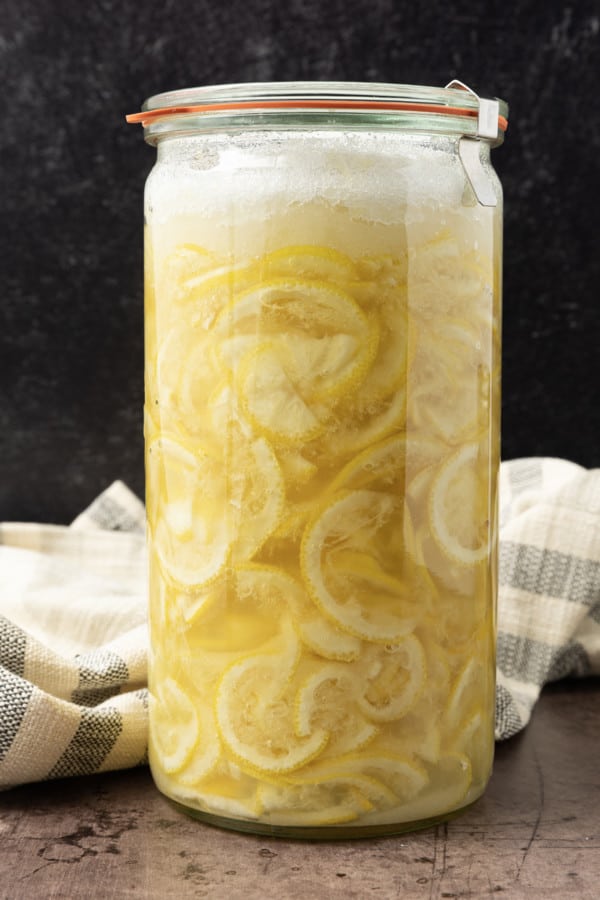
Bonus: this easy recipe has just two ingredients and takes minimal hands on time to make. Make a simple hot herbal tea with the fruit, syrup, and hot water or add it into cocktails, iced tea, marinade for grilled meat, or in a salad dressing. A jar of Cheong is about to be indispensable in your kitchen, too!
Korean Citron Tea (yuja cha) made from Cheong is a comforting sore throat or herbal remedy in the winter months, but it’s also refreshing when added to iced tea or cold water. The health benefits of cheong are many, including a major punch of Vitamin C that can help boost your immune system.
Jars of citron and yuzu tea are sold all over South Korea and are available in many Asian grocery stores, but it’s so easy to make your own at home! And while you get the most authentic citron tea results from using citrons or yuzu, I’ve got you covered if you can’t find those!
Citron Tea
Korean Honey Citron or Yuja tea -or Yuja cha- is traditionally made with fresh citron or yuzu/yuja fruit that has been preserved in sugar or honey. It is also variously known as lemon syrup, cheong, or yuja marmalade because it resembles marmalade with the strips of yuja rind and fruit suspended throughout the syrup.
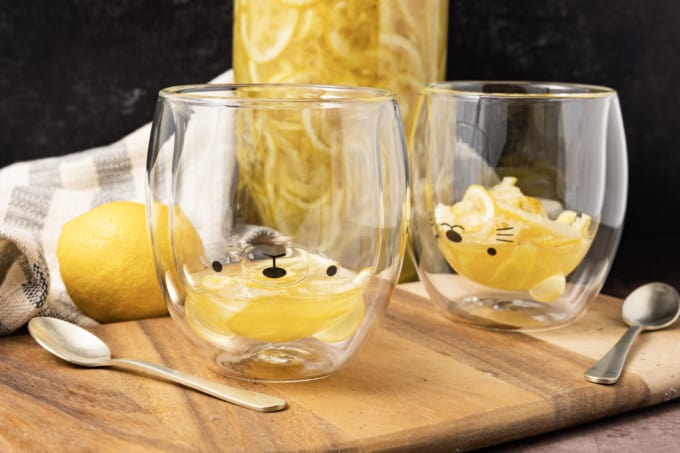
Yuzu fruit or Yuja fruit and citron fruit are types of citrus fruit readily available in Korea. Yuzus or yuja are a cold-hearty Asian citrus fruit originally found in central China and introduced into Japan and Korea. Citron, on the other hand, originated in Asia and was introduced to the Mediterranean where it spread widely.
Citrons have a bumpier, thicker skin and larger seeds than lemons. They are irregularly shaped and have a more pronounced sour taste to them. They’re also terribly difficult to find fresh in the United States.
Fresh yuja or yuzu is a type of citrus with a much stronger aroma than lemons. They taste like a mix of lemon, grapefruit, and Mandarin oranges.
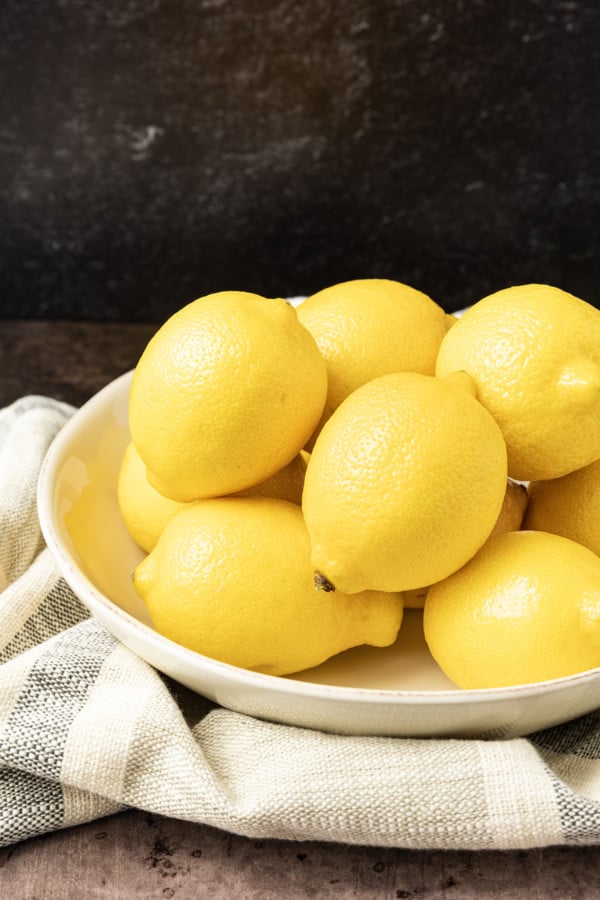
This version of Cheong retains all the goodness of the original Korean product while replacing the more difficult-to-find yuzus or fresh Korean citron with regular lemons or meyer lemon.
When choosing your lemons or meyer lemons for this lemon syrup or cheong, be sure to choose smooth, unblemished lemons that feel heavy for their size. Squeeze them gently.
They should feel soft but not squishy. A lemon that is hard or too firm is likely to have a much thicker pith. This will yield a much more bitter cheong.
Lemon Cheong Recipe
Depending on your personal preference, you can make your lemon syrup with white sugar, raw sugar, or honey, or a blend of those options. The key is to make sure you’re using an equal quantity of the citrus and sugar or honey by weight.
Honey will give the lemon cheong more potential health benefit. And if you combine a little lemon cheong with some homemade fire cider in a mug and top it off with hot water, you have a powerhouse of a health tonic that should help banish any cold or flu!
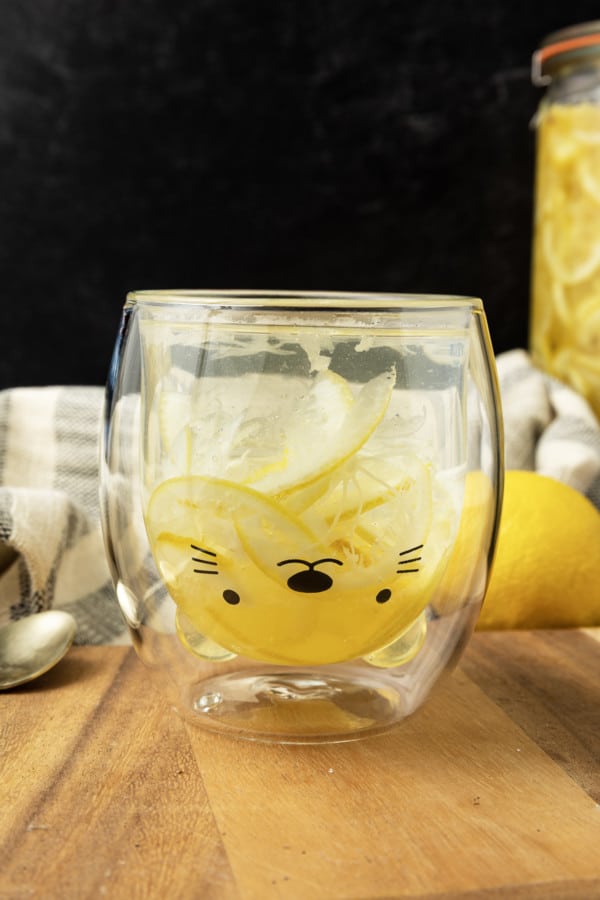
And if you’re so inclined, you can add some grated or thinly sliced fresh ginger to your citron tea. Talk about a cold and flu fighting powerhouse!
Some folks like to eat the fruit and rind from the cheong when they’re done with their tea. I’m one of those people. You get maximum vitamins and minerals out of it that way.
You’re most definitely not required to eat it though to get the benefits and delicious taste.
Before you start whipping up your cheong, though, take some basic kitchen-hygiene precautions. Sanitize the glass jar you’ll be making and storing your cheong in and any bowls and utensils you’re using to make it. To do this, simply run them through your dishwasher on the hottest setting.
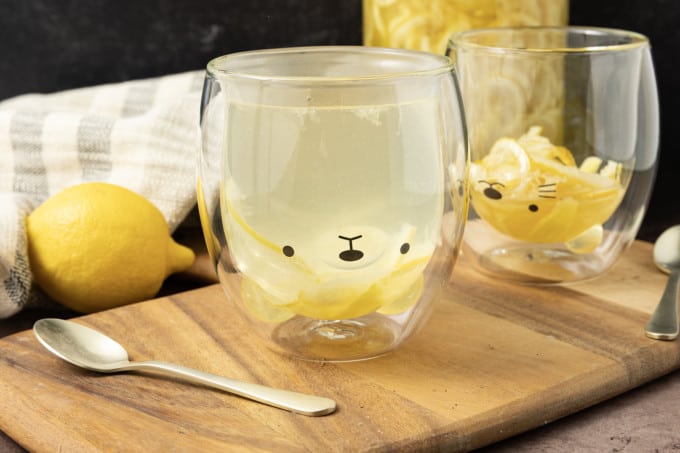
Lemon Syrup
Rinse the lemons then scrub them with baking soda and/or salt to remove any coating,. Then rinse them again and pat them dry. Slice a small sliver off of each end of the lemon then slice it in half lengthwise. Pop out as many seeds as you can.
Slice the lemon halves as thinly as possible using either a knife or food processor slicing blade. Carefully root through and remove any other seeds you find.
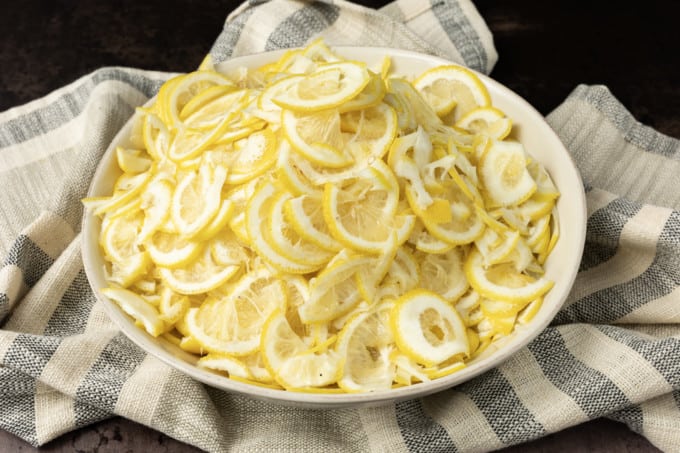
Place a medium sized mixing bowl or large measuring cup on a kitchen scale and turn it on. If necessary, tare the weight to zero. Scrape the lemons into the bowl and make note of the weight.
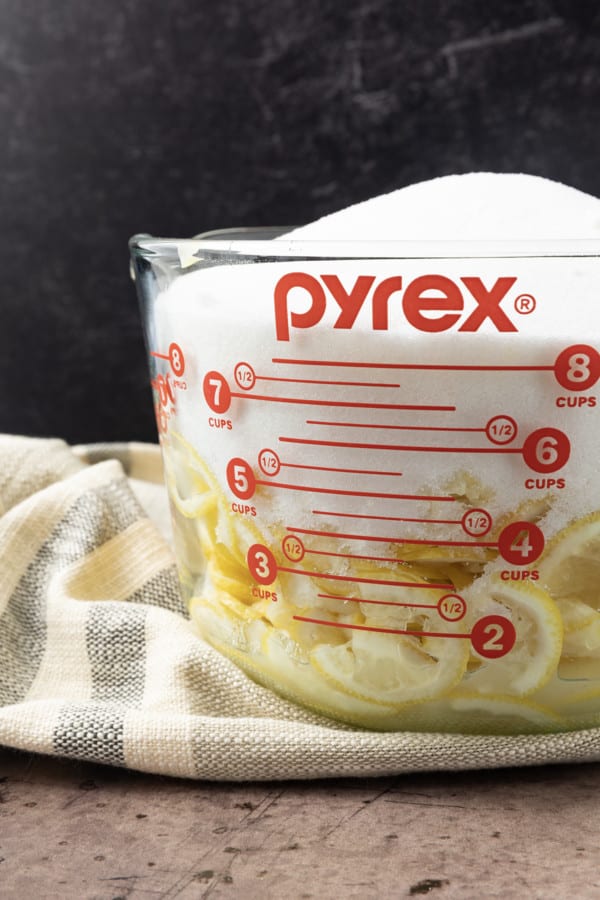
Tare the scale again, and add about ¾ of the total weight of the lemons in honey or granulated sugar. Use your scrupulously clean hands or a wooden spoon to mix the lemons and sugar or honey together.
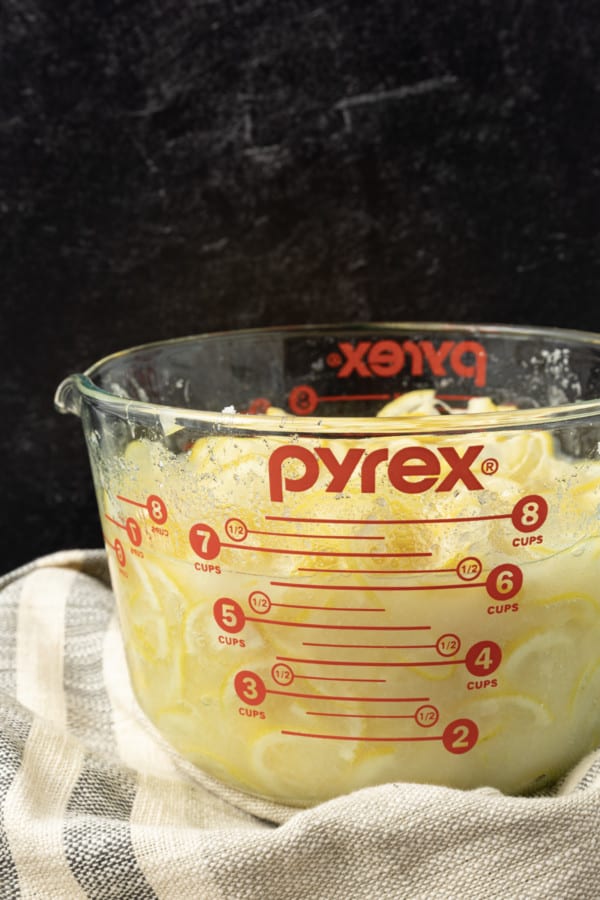
Divide the mixture between the jars you have handy. Press the lemons into the jar firmly to submerge them under the syrup that should already be forming.
Divide the remaining honey or sugar into the jars over top of the lemons. Cover tightly and leave at room temperature out of direct sunlight for 3 days, stirring them and pressing the lemons back down every so often.
Store the finished Cheong -tightly covered- in the refrigerator for up to 6 months.
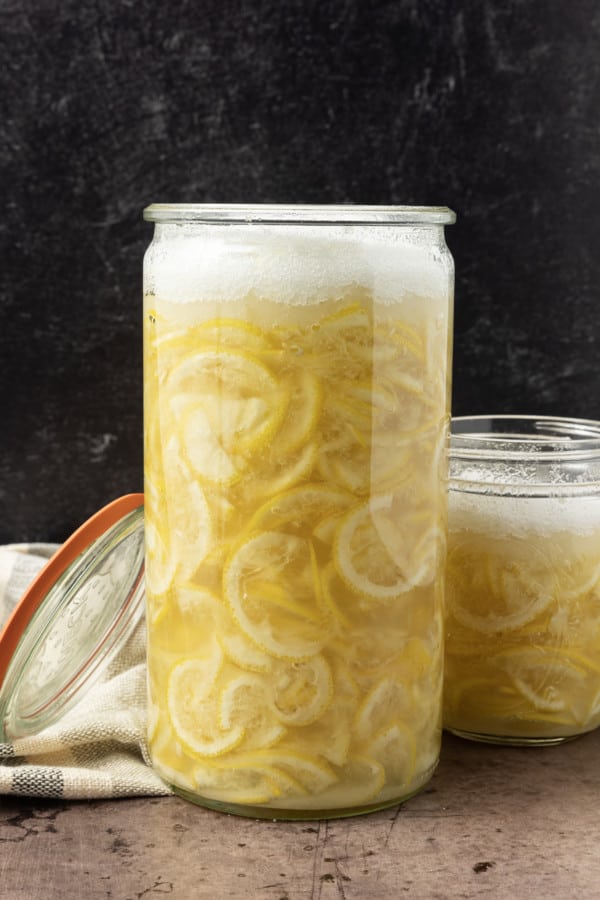
To Make Citron Tea or Yuja Tea:
Scoop as much lemon syrup and fruit into your mug as you’d like. Top it off with very hot or boiling water. Serve with a spoon to stir and sip. You can eat the fruit if you wish.
NOTES:
The amount of sugar you add depends on the size of your lemons. You are going to be adding an equal amount to the weight of your sliced lemons. In general, a lemon weighs about 3 ounces, but that can vary based on the individual lemons you’re using.
While I used granulated sugar for this batch of cheong, you can also make it with raw honey, refined honey, or demerara/raw sugar. Your choice will affect the color of the tea.
The granulated sugar yields a more “true colour” clear and yellow lemon cheong, while the honey or demerara sugar will give it a more caramel coloured syrup. Any of the options will be delicious.
If you’re fond of the lemon and ginger combination, feel free to add some raw, peeled, thinly sliced ginger to your lemons before weighing them.
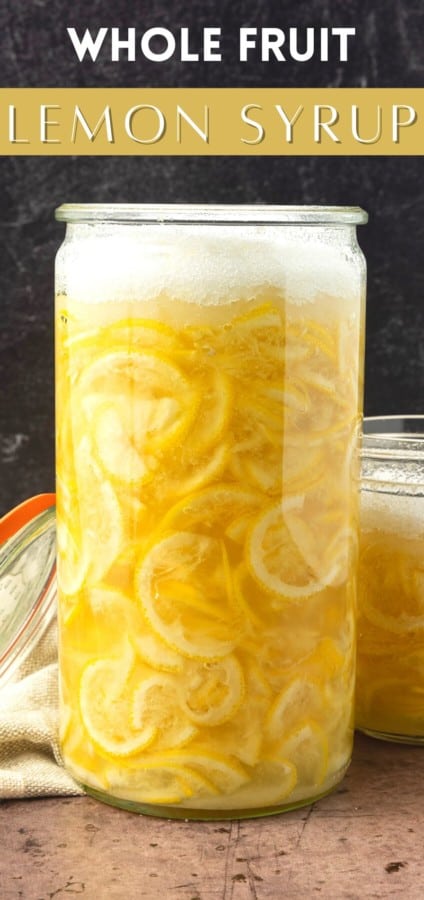
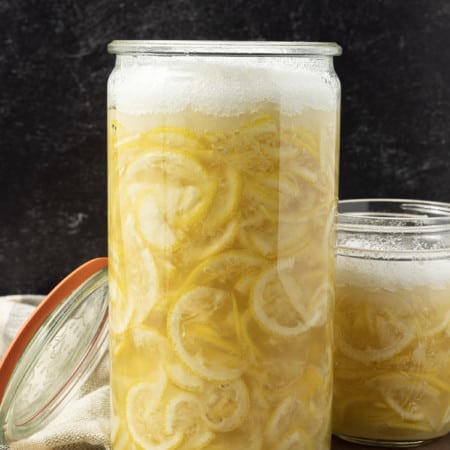
Lemon Syrup or Cheong
Rate RecipeEquipment
- Food Processor or Chef’s Knife
- cutting board
- Kitchen Scale
- mixing bowl
- 2 quart jars or 1.5 liter jars
Ingredients
- 10 lemons or Meyer lemons
- About 2 pound of sugar or honey see notes
Optional:
- Fresh ginger peeled and thinly sliced
Instructions
- Rinse the lemons in a colander, scrub them with baking soda and/or salt to remove any coating, then rinse them again and pat them dry. Slice a small sliver off of each end of the lemon then slice it in half lengthwise. Pop out as many seeds as you can.
- Use a thin slicing blade on a food processor or a chef’s knife, slice the lemon halves as thinly as possible. Carefully root through and remove any other seeds you find.
- Place a medium sized mixing bowl or large measuring cup on a kitchen scale and turn it on. If necessary, tare the weight to zero. Scrape the lemons into the bowl and make note of the weight.
- Tare the scale again, and add about ¾ of the total weight of the lemons in honey or granulated sugar. Use your scrupulously clean hands or a wooden spoon to mix the lemons and sugar or honey together. Divide the mixture between the jars you have handy, pressing the lemons into the jar firmly to submerge them under the syrup that should already be forming.
- Divide the remaining honey or sugar into the jars over top of the lemons. Cover tightly and leave at room temperature out of direct light for 3 days, stirring them and pressing the lemons back down every so often.
- Store the finished Cheong in the refrigerator for up to 6 months.
To Make Citron Tea:
- Starting with about 2 tablespoons, scoop as much syrup and fruit into your mug as you’d like and top off with very hot or boiling water. If you did not add ginger to your cheong when you made it, you can add a couple coins or strips of fresh ginger to the mug as well.
- Stir and sip. You can eat the fruit if you wish.
Notes
Nutrition
Nutritional information is an estimate and provided to you as a courtesy. You should calculate the nutritional information with the actual ingredients used in your recipe using your preferred nutrition calculator.
did you make this recipe?
Make sure to tag @foodiewithfam on Instagram and #hashtag it #foodiewithfamily so I can check it out!
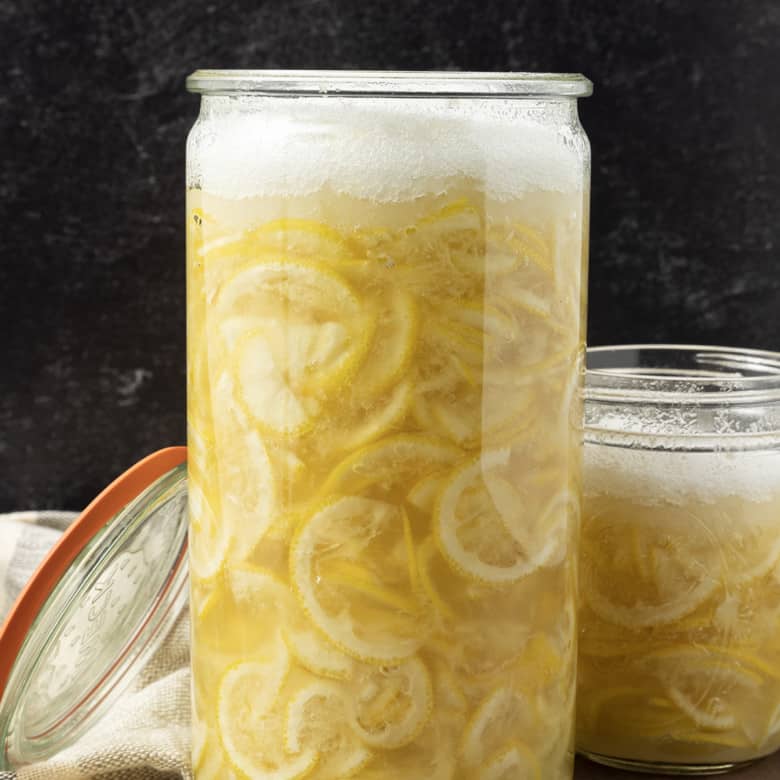
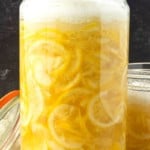

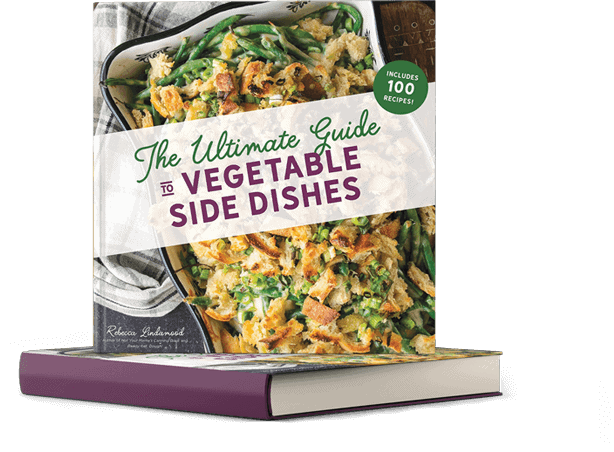
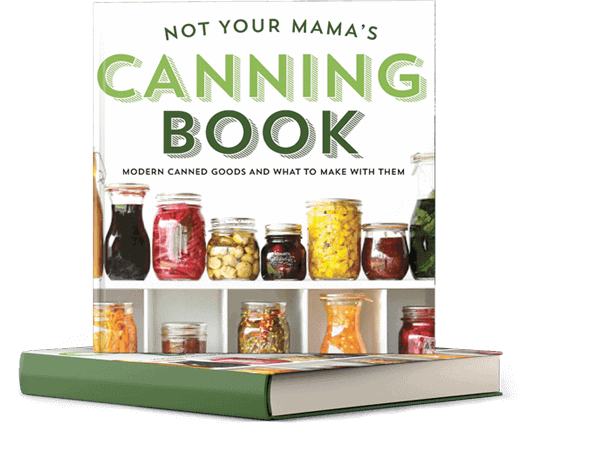
Reader's Thoughts...
Barbara says
I’ve never made this kind of thing before, but I love recipes with ratios so I can decide how much of something I want and not worry about the recipe no matter how much your little while I wanna make!
Rebecca says
Thanks, Barbara!!!
Lynn B says
I love lemons! Thanks for this recipe! Could this be sealed in the canning jars? If so, do you know how long I the hot water bath? Thx!
Rebecca says
Hi Lynn! I am not sure that this would be suitable for canning, but the good news is that it lasts basically forever in the fridge!!
Rebecca says
And you’re so very welcome! I love lemons, too!! This one smells like a burst of freshness every time you open the jar!